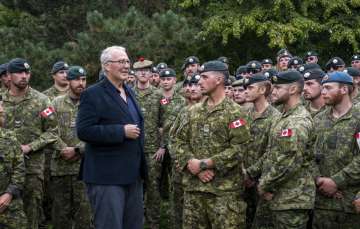Amid diplomatic tensions between India and Canada over the killing of Khalistani terrorist Hardeep Singh Nijjar, Canadian Defence Minister Bill Blair on Sunday asserted that his country's relationship with India is "important" and Ottawa will continue to pursue partnerships like the Indo-Pacific initiative.
Before Canadian Prime Minister Justin Trudeau's "credible" allegations last week linking India's role to Nijjar's murder in British Columbia in June, Ottawa had been seeking deeper relations with India in the fields of trade, defence and immigration.
Blair, in an interview on Sunday, said that Canada will continue to pursue those partnerships while investigating the allegations raised by Trudeau. The minister noted that the Indo-Pacific strategy was critical for Canada as it has led to its increased military presence in the region and commitments for further patrol capabilities.
"We understand that this can be, and has proven to be, a challenging issue with respect to our relationship with India... But at the same time, we have a responsibility to defend the law, defend our citizens, and at the same time make sure that we conduct a thorough investigation and get to the truth," Blair was quoted as saying in a report by Global News.
The Defence Minister furthwr said that if the allegations are proven true, there is a "very significant concern" that Canada will have in relations to "violation of our sovereignty in the murder of a Canadian citizen on Canadian soil".
""I really want [the two countries I love] to start talking. I know once they start talking, once they really want to help their citizens, I'm pretty sure they'll find common ground to make friends," he said in another interview
Canada's military commitmnts in the Indo-Pacific region will cost around $492.9 million over five years, out of a total of nearly $2.3 billion in the same time period.
India-Canada tensions
India-Canada relations nosedived to the lowest point after Trudeau's allegations in Canadian Parliament of "potential" involvement of Indian agents in the killing of Nijjar, who was gunned down in British Columbia's Surrey on June 18.
India angrily rejected the Canadian PM's allegations as "absurd" and "motivated" and expelled a senior Canadian diplomat in a tit-for-tat move to a similar move by Ottawa. India also temporarily suspended visa services for Canadian nationals in view of "security threats" and called for a reduction of Canadian diplomats in New Delhi.
India also advised all its nationals in Canada and those contemplating travelling there to exercise "utmost caution" in view of growing anti-India activities and "politically-condoned" hate crimes. The diplomatic standoff between both countries has laid uncertainties over trade relations, as India and Canada recorded a burgeoning bilateral trade for the past few years.
Canada and India are essential trading partners for each other. Bilateral trade between both countries has risen to around $8.6 billion in 2022. Trudeau himself acknowledged on the sidelines of the G20 Summit that India is an "extraordinarily important economy" in the world. The political acrimony has raised concerns of impacting a robust India-Canada trade.
Moreover, Canada houses a large Indian diaspora, raising concerns among Indian students there after Trudeau's allegations and the suspension of visa services for Canadian nationals.
(with agency inputs)
ALSO READ | Indo-Canadian MP slams own govt for inaction against Khalistani terrorism, expresses fear for Hindus
Latest World News
